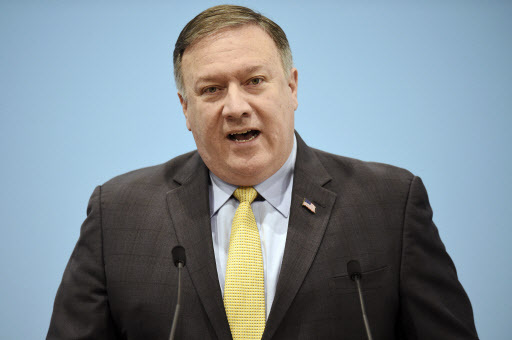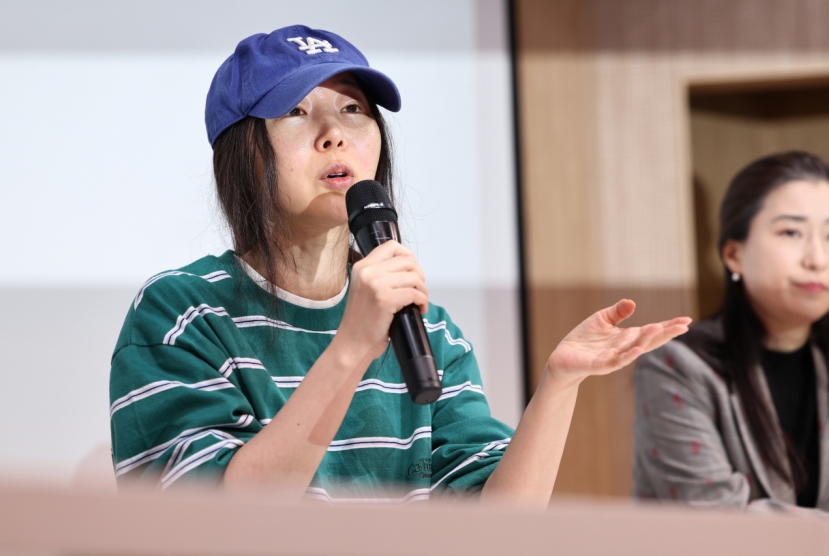Pompeo to travel to North Korea
Pompeo-Kim meeting on Sunday pivotal to denuclearization process
By Ock Hyun-juPublished : Oct. 3, 2018 - 16:56
US Secretary of State Mike Pompeo will travel to North Korea on Sunday to push forward denuclearization talks with North Korean leader Kim Jong-un, as the countries seek to narrow their differences on efforts to rid the Korean Peninsula of nuclear weapons.
After a one-day visit to Pyongyang, Pompeo will travel to Seoul on Sunday and stay through Monday, meeting with President Moon Jae-in and Foreign Minister Kang Kyung-wha. He will then fly to Japan and China to meet his counterparts there, according to the US State Department.
US Special Representative for North Korea Stephen Biegun will accompany Pompeo to Pyongyang on Biegun’s first visit to the country since assuming the post in August.
“I think it shows forward progress and momentum that the secretary is making his fourth trip in less than a year,” State Department Spokeswoman Heather Nauert told reporters. “Everyone recognizes that we have a ways to go and a lot of work that is left to be done.
“These conversations are going in the right direction, and we feel confident enough to hop on a plane to head there to continue the conversations,” she said.
Pompeo’s visit to Pyongyang comes as North Korea is seen as toughening its negotiating stance. It accuses Washington of not doing enough in return for its “goodwill gestures,” for example, stopping its nuclear and missile tests and dismantling the nuclear test site in Punggye-ri.
After a one-day visit to Pyongyang, Pompeo will travel to Seoul on Sunday and stay through Monday, meeting with President Moon Jae-in and Foreign Minister Kang Kyung-wha. He will then fly to Japan and China to meet his counterparts there, according to the US State Department.
US Special Representative for North Korea Stephen Biegun will accompany Pompeo to Pyongyang on Biegun’s first visit to the country since assuming the post in August.
“I think it shows forward progress and momentum that the secretary is making his fourth trip in less than a year,” State Department Spokeswoman Heather Nauert told reporters. “Everyone recognizes that we have a ways to go and a lot of work that is left to be done.
“These conversations are going in the right direction, and we feel confident enough to hop on a plane to head there to continue the conversations,” she said.
Pompeo’s visit to Pyongyang comes as North Korea is seen as toughening its negotiating stance. It accuses Washington of not doing enough in return for its “goodwill gestures,” for example, stopping its nuclear and missile tests and dismantling the nuclear test site in Punggye-ri.

North Korean Foreign Minister Ri Yong-ho said at the United Nations General Assembly that there was “no way” the North would give up its nuclear weapons unilaterally, calling instead for a “corresponding response” from the US.
The stalled denuclearization talks were put back on track after North Korea offered to dismantle its major nuclear complex in Yongbyon if the US took corresponding measures at the inter-Korean summit last month.
But the countries appear to differ on what the corresponding measures should be. North Korea has called for an end-of-war declaration from the US, but it has increasingly made clear it wants more than that in return for dismantling the Yongbyon nuclear compound -- namely, the easing of sanctions.
The North’s state-run Korean Central News Agency said Tuesday that the end of the Korean War can never be a “bargaining chip” for denuclearization, which analysts interpret as a demand for sanctions relief.
Asked whether the Trump administration was considering the lifting of sanctions, Nauert said that there had been “no change” in US policy over the past few months. The US has said sanctions will remain in place until the denuclearization process is complete.
The US has not publicly announced its position on an end-of-war declaration, hesitant to do so in the absence of substantial progress on denuclearization.
With such matters weighing on him, Pompeo is expected to explore the possibility of a second summit between US President Donald Trump and Kim, and to discuss a denuclearization road map while in Pyongyang.
The fact that Pompeo is visiting Pyongyang, in itself, signals progress in the denuclearization talks between North Korea and the US, and he will not return to Washington empty-handed, experts here say.
“Pompeo would not go to Pyongyang had there been no progress. I think the two sides adjusted their differences on what initial steps North Korea and the US will each take,” said Koh Yu-hwan, a Dongguk University professor.
“On the negotiating table will be North Korea’s plan to dismantle the Yongbyon facilities allowing outside inspectors, and the US’ agreement to declare an end to the Korean War and partial sanctions relief,” he said.
Pompeo’s travel plans were revived after he met with his North Korean counterpart, Ri, on the sidelines of the UN General Assembly last week. Earlier, Trump had postponed Pompeo’s trip, citing a lack of progress on denuclearization.
Pompeo’s last trip to North Korea, in July, did not go well. He left Pyongyang hailing progress, but North Korea blast him for making “gangster-like demands.”
“I think the US might have agreed to declare an end to the Korean War, but is wrangling with North Korea over the extent of (the) inspection the North should accept in the process of dismantling the Yongbyon compound,” said Shin Beom-chul, a senior researcher at the Asan Institute for Policy Studies.
North Korea might want to voluntarily dismantle the facilities at its own discretion and open them up for inspection by international experts to verify that it has destroyed them, experts say, while the US appears to be demanding an inventory of nuclear warheads and facilities first, followed by a broader range of inspections.
“While surely Pompeo and Kim won’t be able to create a complete agenda for a second summit, or achieve a massive breakthrough in one meeting, their talks can explore if such a meeting is viable and what both sides might be willing to compromise on,” said Harry Kazianis, director of defense studies at the Center for the National Interest.
“In fact, Pompeo and Kim’s meeting Sunday could be a make-or-break event for US-North Korea relations -- especially if it were to go badly.”
(laeticia.ock@heraldcorp.com)
The stalled denuclearization talks were put back on track after North Korea offered to dismantle its major nuclear complex in Yongbyon if the US took corresponding measures at the inter-Korean summit last month.
But the countries appear to differ on what the corresponding measures should be. North Korea has called for an end-of-war declaration from the US, but it has increasingly made clear it wants more than that in return for dismantling the Yongbyon nuclear compound -- namely, the easing of sanctions.
The North’s state-run Korean Central News Agency said Tuesday that the end of the Korean War can never be a “bargaining chip” for denuclearization, which analysts interpret as a demand for sanctions relief.
Asked whether the Trump administration was considering the lifting of sanctions, Nauert said that there had been “no change” in US policy over the past few months. The US has said sanctions will remain in place until the denuclearization process is complete.
The US has not publicly announced its position on an end-of-war declaration, hesitant to do so in the absence of substantial progress on denuclearization.
With such matters weighing on him, Pompeo is expected to explore the possibility of a second summit between US President Donald Trump and Kim, and to discuss a denuclearization road map while in Pyongyang.
The fact that Pompeo is visiting Pyongyang, in itself, signals progress in the denuclearization talks between North Korea and the US, and he will not return to Washington empty-handed, experts here say.
“Pompeo would not go to Pyongyang had there been no progress. I think the two sides adjusted their differences on what initial steps North Korea and the US will each take,” said Koh Yu-hwan, a Dongguk University professor.
“On the negotiating table will be North Korea’s plan to dismantle the Yongbyon facilities allowing outside inspectors, and the US’ agreement to declare an end to the Korean War and partial sanctions relief,” he said.
Pompeo’s travel plans were revived after he met with his North Korean counterpart, Ri, on the sidelines of the UN General Assembly last week. Earlier, Trump had postponed Pompeo’s trip, citing a lack of progress on denuclearization.
Pompeo’s last trip to North Korea, in July, did not go well. He left Pyongyang hailing progress, but North Korea blast him for making “gangster-like demands.”
“I think the US might have agreed to declare an end to the Korean War, but is wrangling with North Korea over the extent of (the) inspection the North should accept in the process of dismantling the Yongbyon compound,” said Shin Beom-chul, a senior researcher at the Asan Institute for Policy Studies.
North Korea might want to voluntarily dismantle the facilities at its own discretion and open them up for inspection by international experts to verify that it has destroyed them, experts say, while the US appears to be demanding an inventory of nuclear warheads and facilities first, followed by a broader range of inspections.
“While surely Pompeo and Kim won’t be able to create a complete agenda for a second summit, or achieve a massive breakthrough in one meeting, their talks can explore if such a meeting is viable and what both sides might be willing to compromise on,” said Harry Kazianis, director of defense studies at the Center for the National Interest.
“In fact, Pompeo and Kim’s meeting Sunday could be a make-or-break event for US-North Korea relations -- especially if it were to go badly.”
(laeticia.ock@heraldcorp.com)
-
Articles by Ock Hyun-ju



![[Herald Interview] 'Amid aging population, Korea to invite more young professionals from overseas'](http://res.heraldm.com/phpwas/restmb_idxmake.php?idx=644&simg=/content/image/2024/04/24/20240424050844_0.jpg&u=20240424200058)
















